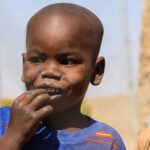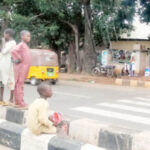COVID-19 came to reveal the underbelly of a self-built, self-engineered and self-inflicted national decadence and underdevelopment in virtually every aspect of our national life. The COVID-19 conundrum started tamely towards the end of 2019, in Wuhan, a town in China. Within a year, the entire world was gripped by a pandemic, paralysing the world, curtailing national and international travels. Nigeria accounted for 3.8% of Africa’s COVID-19 cases and 1.8% of the total African deaths. Africa itself accounted for just 3.3% of the global cases and 4.0% of the global deaths. This was not supposed to be! According to the hysterical prediction of the humanitarian philanthropists, “millions will die in Africa with dead bodies out there in the streets”. Fortunately, it did not turn out as devastating as predicted, perhaps not because of what we did, but because of what the virus did not do.
- Governors unanimous on killing of all bandits, terrorists – El-Rufai
- Deby’s death, Nigeria and Boko Haram insurgency
On the impact of COVID-19 on our education, technology and human development, we are dealing with an ongoing epidemic, the end of which we do not yet know. We are dealing with an evasive, elusive and seemingly invincible enemy aided and abetted by our disdain of, as well as disregard and disrespect for, the enemy. During this epidemic, we demonstrated an aversion to taking the basic non-pharmaceutical interventions required to rein in the enemy. Before COVID-19 came, Nigeria’s education system had been in comatose, chaos and confusion. We had turned our education into a mess of infrastructural degeneration and dilapidation, a monumental waste of resources and despicable conditions of service. Today, we have over 10 million out-of-school children. We roll out universities by the day, like the manufacturers of indomie and pure water, with little attention to maintenance and sustenance of quality. Meanwhile, the Association of Striking University Unions (ASUUs), took turns in paralysing the university system. Perhaps the greatest impact of COVID-19 on the development and future of education in Nigeria will be at secondary and primary education levels. No one knows when normalcy will return, therefore there is a need to institute some mitigation strategies to limit the impact on the education of our children. The COVID-19 outbreak should be seen as an opportunity to tackle the three major crises of Nigeria’s education- poor access, low quality and inequity.
At the economy, industry and technology fronts, COVID-19 was either a stimulus package or a triple package of provocation, vexation and frustration. The urgent need to control the COVID-19 outbreak and prevent a total collapse of the global economy provided the catalytic and positive stimuli for the application of technology in the health, service and goods delivery, payment processing and organisation of virtual meetings sectors. The highly industrialised and technologically advanced economies reaped and continue to reap huge returns under COVID-19 watch. On the other hand, technology-consuming nations have been at the receiving end of the changes brought by the COVID-19 lockdown of some aspects of the global economy. The need for mass laboratory testing at the global level led to improvement in the technology and development of diagnostic test kits and reagents. The global COVID-19 diagnostics market size is expected to reach USD 7.8 billion by 2027. Similarly, to meet the demand for vaccines, the global COVID-19 vaccine market size is estimated to be worth USD 25 billion by 2024. The sad part of all these is that Africa, the consuming technologically underdeveloped continent, will remain consumers, receiving no revenue from this expanding market, but fretting away our resources.
The COVID-19 disruption was not all sweet for the technology sector, especially the hardware, software, and Information Technology (IT) fronts. The COVID-19 restrictions disrupted the global supply chain, from raw materials to intermediate and finished goods. On the home front, the Nigerian telecoms industry experienced a boom like its counterpart in the developed economies. The adoption by many organisations and schools of Working from Home (WFH) protocols has been a huge boost for the communication sector. The Nigerian Communications Commission (NCC) reported increases in the volume of voice and data traffic, necessitating the installation of more fibre-optic cables to boost capacity. The MTN Nigeria reported an average growth in revenue of about 20.3 per cent for the first quarter of 2020. On the other hand, with the restrictions on social gatherings, major international and national sports events (Tokyo 2020 Olympics, Edo 2020) have either been postponed or cancelled. It was reported that the Nigerian computer-related business lost between N15 billion to N20 billion within the first three months of COVID-19 because of hardware goods belonging to some Nigerian phone and computer vendors are stuck in China.
The UNDP’s Human Development Index (HDI) country ranking measures the progress of countries and classifies the level of human development into Very High, High, Medium and Low development. Nigeria has remained for years, in the low human development group. Nigeria is largely an uneducated and inequitable society, under the influence of poor governance. Nigeria has abandoned science and technology as tools for achieving socio economic transformation and development and for solving the problems of underdevelopment – illiteracy, unemployment, insecurity, hunger and poverty.
The misplaced priority of the government, the protective self-interest of the elite and scientists and the indifferent ignorance of the general society are the ingredients of the conspiracy that have led to the under-development of Nigeria. To move forward, Nigerian scientists must show relevance through research targeted to solving societal problems. The government must stop paying lip service to the development of science in Nigeria and use science and technology as the instrument for improving our daily living. The society must demand, as of right, a better and improved standard of living from the government and scientists. We must avoid the Seven Social Sins, which hamper the orderly development of a society. These are: Wealth without work,Pleasure without conscience,Knowledge without character,Commerce without morality,Science without humanity Religion without sacrifice and Politics without principle.
These seven social sins (SSS) determine our type of society. The scientist among us who does science without humanity acquires knowledge without character is in the same class and has no moral ground to condemn the businessman engaged in commerce without morality or the politician without principles or the priest without sacrifice, because they are enjoying wealth or fame without work and rolling in pleasure without conscience. They each contribute their quota to the underdevelopment of our country.
Oyewale Tomori is the Fellow and Past President, Nigerian Academy of Science

 Join Daily Trust WhatsApp Community For Quick Access To News and Happenings Around You.
Join Daily Trust WhatsApp Community For Quick Access To News and Happenings Around You.


